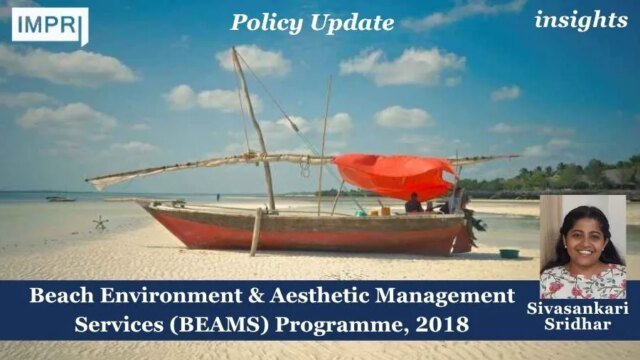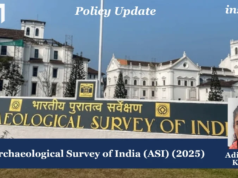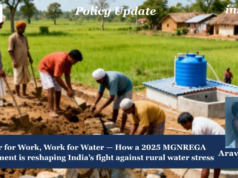Policy Update
Sivasankari Sridhar
Background
The Beach Environment & Aesthetic Management Services (BEAMS) Programme is an initiative of the Ministry of Environment, Forest and Climate Change (MoEFCC), Government of India. It is implemented under the Integrated Coastal Zone Management (ICZM) initiative through the Society of Integrated Coastal Management (SICOM).
The programme was launched to conserve and sustainably manage India’s coastline and promote ecologically responsible beach tourism. Rapid coastal degradation due to tourism pressure, plastic pollution, improper solid-waste management, and climate-related impacts such as erosion and sea-level rise created the need for an institutional-level intervention.
BEAMS aims to improve the environment, hygiene, and aesthetic value of beaches while protecting coastal ecosystems. It aligns with India’s efforts to obtain global recognition for clean and sustainable beaches, such as the “Blue Flag” eco-label, which represents high international standards for cleanliness, safety, and environmental management.
Functioning
The BEAMS Programme is designed to promote sustainable beach management by improving ecological health, infrastructure quality, and stakeholder engagement. The programme’s functioning is guided by the principles of pollution abatement, ecosystem conservation, and enhancement of aesthetic and recreational value.
Key components include:
• Regular monitoring and conservation of coastal water quality
• Solid and liquid waste management, including removal and scientific disposal of marine litter
• Conservation of sand dunes, beach vegetation, and biodiversity
• Awareness campaigns to reduce pollution and promote responsible tourism
• Providing eco-friendly amenities such as changing rooms, walkways, signages, and safe access for visitors
• Promoting systematic beach management through guidelines aligned with international Blue Flag standards
The objective is to create sustainable tourism models where maintenance of ecosystem health goes hand-in-hand with providing visitor facilities and livelihood opportunities for local communities.
Performance
The BEAMS Programme (Beach Environment & Aesthetics Management Services), launched by the Ministry of Environment, Forest and Climate Change, aims to reduce coastal pollution, improve beach infrastructure, and promote sustainable tourism. It has been implemented on about 10 beaches across six states and three union territories, developed to meet international Blue Flag standards.
As a result of BEAMS interventions, marine litter has reduced by nearly 85% and marine plastic by about 78% over three years. Around 750 tonnes of marine litter have been scientifically disposed of, and about 95,000 square metres of sand dunes have been restored with native plantations. Nearly 1,100 million litres of water are saved annually through recycling systems, while over 1.25 lakh visitors have been educated on responsible beach behaviour.
The programme has also improved local livelihoods, providing alternate employment to around 500 fishing families, and beach tourism has seen nearly an 80% rise in footfall. The government plans to extend BEAMS to about 100 more beaches under the Integrated Coastal Zone Management initiative.
Impact
BEAMS has helped bring national attention to the importance of coastal conservation and scientific beach management. By integrating ecological protection with recreational and tourism objectives, BEAMS has contributed to a healthier coastal environment.
The programme’s focus on pollution control, marine litter removal, and biodiversity conservation has supported the rejuvenation of coastal ecosystems. At the same time, improved infrastructure and well-maintained tourist facilities have made beaches more appealing to both domestic and international travellers.
The Blue Flag certification gained by multiple Indian beaches under BEAMS has improved India’s standing in global sustainable tourism rankings. Local communities have also benefited through enhanced awareness, employment opportunities, and involvement in eco-tourism services.
Emerging Issues
Despite steady progress, the BEAMS Programme faces several challenges such as:
• High cost of infrastructure upgrades required to meet global standards
• Inconsistent implementation across states and local administrations
• Lack of adequate monitoring and reporting systems
• Continued plastic pollution and inadequate public behaviour change
• Growing climate-induced threats including erosion, storms, and sea-level rise
• Sustaining maintenance and upkeep of eco-friendly facilities over the long term
These challenges highlight the need for stronger governance, sustained funding, and more extensive community involvement.
Suggestions
To improve the BEAMS Programme further, the following steps may be considered:
• Strengthen collaboration among central ministries, state governments, and local bodies
• Establish a national digital dashboard to monitor beach cleanliness, biodiversity, and infrastructure
• Promote community participation and livelihood integration through eco-tourism enterprises
• Conduct nationwide awareness campaigns on responsible beach behaviour
• Enhance scientific research on coastal ecosystem management and climate resilience
• Expand Blue Flag preparedness to more beaches by building technical capacity
• Introduce long-term funding models to support operation and maintenance of beach facilities
Way Forward
India’s coastline is a valuable ecological and economic resource. To sustain it, ongoing and structured efforts are required to balance conservation with tourism. Going forward, BEAMS must prioritise climate-resilient infrastructure, strong data-based monitoring, and greater engagement with coastal communities.
The programme should be integrated with broader coastal protection schemes, including mangrove restoration, disaster-risk mitigation, and marine-litter reduction plans. Long-term partnerships with private stakeholders, research institutions, and civil society will also be essential.
With continued implementation, BEAMS can set strong standards for clean, safe, and ecologically vibrant beaches across India, strengthening both livelihoods and the national tourism sector.
References
Ministry of Environment, Forest and Climate Change. (2020, September 18). In a first, eight beaches of India recommended for the coveted “Blue Flag” international eco-label. Clean beaches are a testimony to environment in the coastal area: Shri Prakash Javadekar [Press release]. Press Information Bureau. https://www.pib.gov.in/PressReleaseIframePage.aspx?PRID=1656392
Ministry of Environment, Forest and Climate Change. (2021, September 21). Two more Indian Beaches get coveted International Blue Flag Certification: India now has 10 Blue Flag beaches [Press release]. Press Information Bureau. https://www.pib.gov.in/PressReleasePage.aspx?PRID=1756806
Press Information Bureau. (n.d.). [Title Unknown] [Press release]. Government of India. https://www.pib.gov.in/PressReleseDetail.aspx?PRID=1534329
Tamil Nadu Department of Environment. (n.d.). Blue Flag Beaches – Beach Environment & Aesthetic Management Services (BEAMS). Government of Tamil Nadu. https://www.environment.tn.gov.in/doe/blueflag
About the Contributor
Sivasankari Sridhar is currently pursuing her bachelor’s in economics from Dr B.R. Ambedkar School of Economics, Bangalore, and is also a research intern at IMPRI.
Acknowledgement: The author sincerely thanks the IMPRI team for their valuable support.
Disclaimer: All views expressed in the article belong solely to the author and not necessarily to the organisation.
Read More at IMPRI:
Pradhan Mantri Anusuchit Jaati Abhyuday Yojana (PM – AJAY): 2021-22



















